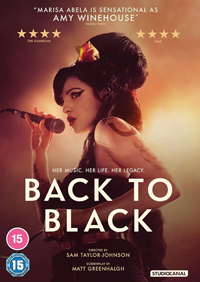Unfamiliar with Amy Winehouse’s music and story as I was, my interest was nevertheless piqued by the trailer for the newly released biopic about the ill-fated British singer-songwriter: Back to Black, which covers her life from the age of 18 to her death from alcohol poisoning at 27 in 2011.
 Winehouse’s rise to fame coincided with the busiest period of my own life, when I wasn’t bothering with new music. Before watching Back to Black I didn’t research Winehouse or listen to her albums—I just wanted to be entertained for a couple of hours with a bag of popcorn—so the film’s historical accuracy and the authenticity of the lead female’s performance aren’t things I can comment on.
Winehouse’s rise to fame coincided with the busiest period of my own life, when I wasn’t bothering with new music. Before watching Back to Black I didn’t research Winehouse or listen to her albums—I just wanted to be entertained for a couple of hours with a bag of popcorn—so the film’s historical accuracy and the authenticity of the lead female’s performance aren’t things I can comment on.
Because Back to Black foregrounds a real woman’s story it held vastly more interest for me than the horror films, sequels/prequels and mindless action movies that are thick on the ground this month. I wasn’t disappointed. In spite of the fact that Winehouse’s life story includes losses, depression, addictions and relentless hounding by the paparazzi, I found Back to Black to be an entertaining introduction to Amy Winehouse. This is likely because director Sam Taylor-Johnson (Fifty Shades of Grey) intended for her film to be a celebration of the artist’s life. She barely hints at Winehouse’s eating disorder (bulimia). There are no unflattering scenes of her doing crack or heroin. Taylor-Johnson said in an interview that on an emotional level, the story is told through Winehouse’s songs. It’s an emotional movie, and ‘Back to Black’ refers to her album of the same name that won five GRAMMY awards in 2008. The screenwriter, Matt Greenhalgh, said he based his script on her lyrics and things she had said in interviews.
This isn’t Mancunian Greenhalgh and London-born Taylor-Johnson’s first biopic about a British music legend; they also depicted John Lennon’s adolescence in Nowhere Boy in 2009. Having a filmmaking team that was intimately familiar with London yielded satisfying results. It’s doubtful a Hollywood filmmaking team could have produced something this authentic. Taylor-Johnson takes us into London (Camden) pubs, clubs and alleys, as well as the zoo. She takes us in deeper than London’s biggest tourist attractions.
The film centres on Winehouse’s turbulent relationship with husband/ex-husband Blake Fielder-Civil, her music career and the addictions that finally killed her. It also focuses on the close, loving relationship she enjoyed with her grandmother Cynthia and her complicated relationship with her father, Mitch.
Back to Black grabbed my attention from the first and held it to the end. It opens with Amy, played by 27-year-old Brighton-born Marisa Abela, running down the street as she narrates how she wants to be remembered. It then cuts to a family reunion that occurred years previously, in which an adolescent Amy tells Cynthia (played by Lesley Manville) in the dining room that she is her style icon. It’s doubtful many grandmothers have been told that (later Amy calls Cynthia her “everything icon”), and Amy’s great admiration for her grandmother is one of the things that endeared her to me. In the living room, meanwhile, the family is making music, singing along to piano accompaniment. Amy joins them, singing ‘Fly Me to the Moon’, which becomes a duet with Mitch (Eddie Marsan). We’re left with the impression that Amy comes from a close-knit Jewish family.
When Mitch drives Amy home afterwards we learn that he and Amy’s mother have separated and Amy hasn’t accepted this situation. She invites him in to talk to his ex and when he resists, her temper flares. Though she has a close extended family, her immediate family is broken. And the more we see of her, the more fragile she appears.
Amy’s career takes off when she is only 18 and still saying things like: ‘I’m not a feminist; I like boys too much’. And yet, she still assertively stands up to studio execs and walks out on a meeting with them when they try to change her. Fragile but also fierce.
In a pub Amy meets Blake (Jack O’Connell), who introduces her to The Shangri-Las and dances for her to ‘Leader of the Pack’—a diverting performance. Unfortunately, he will also introduce her to hard drugs. She falls madly in love with him, but their self-destructive, violent relationship exacerbates her addictions.
When Cynthia tells Amy she has lung cancer, when Blake disappoints her, when he goes back to his ex-girlfriend, Amy drowns her pain in alcohol. When her manager tries to convince Mitch that she needs to go to rehab, Mitch takes her word for it that she doesn’t. Her personal life is full of struggles, and she clearly can’t cope. Eventually Amy asks Mitch to take her to rehab—not a moment too soon.
Back to Black has things to offer female viewers, including an assertive lead female trying to make the best of an unhappy personal life and a close grandmother-granddaughter relationship. It also includes affection, congeniality and solidarity between the female characters. It’s worth mentioning these female-oriented inclusions because they’re still too rare in film. Another point in the movie’s favour is the number of women who worked behind the scenes. Besides the director, five of the producers were women. And as just a few examples, casting, photography, production design, set decoration and costume design were entrusted to women.
Amy says that she writes songs to make something good out of something bad and that she wanted her singing to help people forget their troubles, if only for five minutes. She succeeded, and Back to Black helped me forget mine for an enjoyable couple of hours. Now I’m definitely going to bother discovering Amy Winehouse.
Back to Black is rated R and has a running time of 120 minutes. It was released on May 17.
 Alline Cormier
Alline Cormier
Film analyst
See all articles by Alline Cormier



